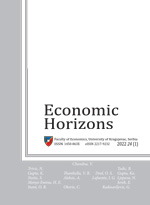INTERNATIONAL MIGRATIONS AND INCOME CONVERGENCE IN EUROPEAN TRANSITION COUNTRIES
Tijana Tubić Ćurčić and Nenad Stanišić
Faculty of Economics, University of Kragujevac, The Republic of Serbia
The subject matter of this paper is the analysis of the influence of international migrations on income convergence in European transition countries in the period 2000-2020. Convergence can be defined as the process of catching up richer countries by poorer ones, consequentially leading to the reduction of disparities in income per capita among countries. Theoretically, human migrations are a mechanism of the adjustment of the regional imbalance that contributes to the strengthening of convergence. The regression panel model was used in the research. The research results have shown that, if observed at the level of the entire sample of the countries of Central and Eastern Europe and the Western Balkan countries (CEE-11+WB), there is a positive and statistically significant influence of emigration on income convergence. Also, there is a positive influence of emigration on the income convergence per capita of the CEE-11 countries towards the average income of the developed countries of the EU-15. On the other hand, observed only at the level of the Western Balkan countries, there is no statistically significant influence of emigration on income convergence. The contribution of the research study reflects in filling the gap that exists in the literature on this field, since there is no large number of papers that have examined the influence of migrations on income convergence in the CEE-11 countries, as well as the Western Balkan countries.
Keywords: international migrations, income convergence, European transition economies, panel data
JEL Classification: F22, J61, O15, O47




